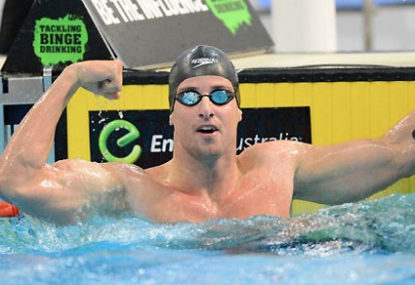'An iconic roster': LeBron, Steph, KD headline all-star cast for Team USA's shot at Olympic glory
LeBron James is going back to the Olympics for the first time in 12 years. Steph Curry is headed to the games for the…

At the national titles in Adelaide this week, the Australian Swimming Team sent a clear warning to Olympic rivals that they will be a force to be reckoned with in Rio.
The performances have been positively framed to reassure a fanatical sporting public that their status as a global swimming powerhouse is not under threat.
Hope is rampant that swimming will once again provide the basis for a successful Australian Olympic campaign in Rio, leaving history to judge London as an isolated failure.
Nobody wants to ask questions that might raise the possibility of repeated Olympic failure.
The ‘F’ word is outlawed in a nation suffering a steady decline in international sporting success since hosting the Olympics in 2000.
Have our swimming stars peaked too early? Can they continue this form in Rio? Will the American’s find their best form come August?
Matt Grevers, Missy Franklin and Nathan Adrian are just some of the American swimmers who have the potential to dash Australian gold medal dreams in Rio.
These swimmers have more than two months until they have to peak for their national trials, held just five weeks out from the Olympics. With a clear understanding of the performance standards of their opposition, they can train away from the spotlight in a quest to peak when it matters most.
In contrast Australian swimmers have four months of intense media spotlight, the hopes of a nation resting on their ability to continue the high standards set over the week.
Australian failure at the London Olympics has largely been symbolised by the defeat of sprinter James Magnussen by American Nathan Adrian. While Adrian swam a personal best for the 100 metres in the final, Magnussen fell short of the time he had posted in the April trials.
Has Magnussen been used a scapegoat to hide the deeper structural problems of Australian Olympic planning in the way swimmers are forced to peak months out from the games?
Another failure in Rio must result in an evolution of scheduling methods if Australia does not want to be left behind in an evolving sporting landscape.